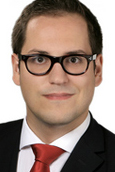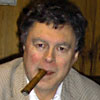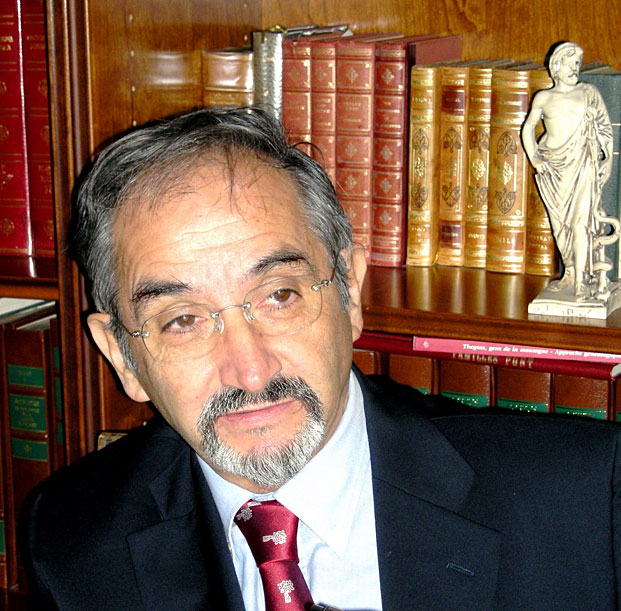Frederik Cyrus Roeder

Frederik Roeder is a German health economist. He studied hospital management, health economics and international business at the universities of Goettingen (Germany), Bayreuth (Germany), Maribor (Slovenia), and Tongji Shanghai (China). He has worked as a Visiting Professor for Health Economics at the Lithuanian University of Health Sciences and as a Visiting Professor for Healthcare Management and Economics at Ilia State University (Georgia). Fred Roeder is the Managing Director of Healthcare Solutions, a service focused on know-how transfer and policy advise for healthcare systems in transition.
Michael Schlander
Professor Michael Schlander MD, PhD, MBA is a health economist at the University of Heidelberg and a professor of health care and innovation management at the University of Applied Economic Sciences, Ludwigshafen. He is the founder and scientific director of the Institute for Innovation and Valuation in Health Care (Inno Val HC) a not for profit institute based in Eschborn, Germany. Professor Schlander who is also a physician has written ground-breaking studies on the role and limits of current evaluation methodology in adminstrative assessments of medical innovation.
Nicoleta Acatrinei
Graduate in economics and in theology, Nicoleta is currently preparing a PhD at the Swiss Federal Polytechnicum (ETH) in Zurich. She has spoken and written on topics related to ethics, economy and theology in Switzerland, China, Denmark and others. She is the author of "St Jean Chrysostome et l'Homo Oeconomicus" a scholarly work that explores the theological roots of market ethics. She has joined Medicine & Liberty in 2009 as our research fellow in charge of Ethics in Economics.
Francis Thevoz
Dr Francis Thevoz is a Cardiovascular surgeon by training. Past-president of the Société Vaudoise de Médecine he is also a former councilor of the City of Lausanne where he served as Director of finances. He is currently a member of the finance commision of the city's parliament. Francis will notably participate in the development of MedLib's, Privamed-Pro project.
Sophie Crespo
Sophie Crespo MD, our special projects & editorial consultant based in Geneva, graduated from Basel University Medical School. She holds specialist titles in intern al medicine and anesthesiology.
Contact: sophiecrespomd@medlib.ch
Fabienne Gay-Crosier
Dr Fabienne Gay-Crosier, joined MedLib's Medical Advisory Council in 2014. She is past president of the professional policy commisssion at the Swiss Society of Clinical Allergology and Immunology and is a firm advocate of professional independence for physicians. Author of "Geneva's White Paper on Allergy" Fillon Impr. Oct. 2015.
Loredana D'Amato Sizonenko MD
Dr D'Amato Sizonenko is a geneticist specialized in rare diseases. She is presently Coordinator for Switzerland of Orphanet, an international database of information on rare diseases and orphan drugs for all publics, designed to contribute to the improvement of the diagnosis, care and treatment of patients with rare diseases.
Martín Krause
Martin Krause is the diirector of the Centro de Investigations de instituciones y Mercados de Argentina: professor of Economics at the University of Buenos Aires.
Philip Stevens
Philip Stevens, Director of Policy at International Policy Network, London is the author of numerous health policy publications, including Fighting the diseases of Poverty (2007), Free trade for better health (2006) and The 10/90 Gap and the diseases of poverty (2004). He has also held research positions at the Adam Smith Institute and Reform in London and holds degrees from the London School of Economics and Durham University.
Shahnaz Radjy
After graduating in Biology at UPenn in Philadelphia, Ms Shahnaz Radjy was active in humanitarian action in Bolivian hospitals, and founded an A-TIC internet venture in Bolivia. She has also organized events for the International Labor Organization in Geneva and worked for the Davos World Economic Forum. Shahnaz is now based in NY and works as senior communications specialist for Vitality.
Bart Madden
Bartley Madden is an independent researcher who has developed "Dual Tracking": a fast lane for access to experimetal medicines, that also introduces an open database on new therapies. Bart Maddens concept is supported by Vernon Smith, Nobel prize in economics 2002 and by other reputed US economists. He has authored a monograph: "Dual Tracking, More Choices Better Health" edited by the Heartland Institute, Chicago.
Stefan Metzeler
Graduate from the Ecole Polytechnique Fédéerale de Lausanne (EPFL). Information and technology specialist, owner at Amadeus IT solutions. Swiss representative fo the International Society for Individual Liberty ISIL.
Contact: smetzeler@medlib.ch
Pierre Bessard
Executive Director of the Institut Constant de Rebecque, Lausanne, and President of the Liberales Institut, Zurich
Henri Siegenthaler
President of the Swiss Society for the Independence of medicine and editor in chief of « Der Arzt und sein Patient / Le Médecin et son Patient » Journal. Author of "Serons nous tous euthanasiés?" Ed.Cabedita (2015).
Pierre Lemieux

Professor of economics at the University of Québec in Outaouais. Author of "Le Droit de porter des armes"(1993), "Comprendre l'économie (2008) and other works such as "Public Health Insurance under a Non Benevolent State". Editor of Liberty in Canada online tribune.
Georges Lane
Georges Lane is a Professor of economics at the University of Paris-Dauphine where he teaches insurance economics.
Philip Stevens
Philip Stevens, Director of Policy
Philip is the author of numerous health policy publications, including Fighting the diseases of Poverty (2007), Free trade for better health (2006) and The 10/90 Gap and the diseases of poverty (2004). His writings on health policy have appeared in a wide range of international newspapers. Philip has also held research positions at the Adam Smith Institute and Reform in London, and spent several years as a management consultant. He holds degrees from the London School of Economics and Durham University.
Ernest Truffer
Swiss ENT surgeon and medical philosopher. One of the founding members of IATROS, a world organization of private and independent physicians. Writes regularly on medical ethics and other issues in various medical journals and in his blog.
Ernest unfortunately passed away on March 11th, 2015 and wil be deeply regretted by all those who knew him. The founding principles of Medicine and Liberty were strongly influenced by his profound understanding of the medical mission and his uncompromising attachment to Hippocratic ethics.
Gabriel Calzada
Professor of economics at the Universidad Rey Juan Carlos, Madrid. Founder of Medicina en Libertad (MedLib.es) and of Madrid's Instituto Juan de Mariana.
Gabriel is president of Francisco Marroquin University in Guatemala and member of the presidential board of the prestigious Mont Pelerin Society
Victoria Curzon Price
Professor of economics at the University of Geneva. President of Institut Constant de Rebecque, Lausanne. Member of Geneva Parlliament. Past president of the Mont Pelerin Society.
Rudolf Mayer
A practicing Opthalmologist in Lausanne. Active in Swiss medical professional politics he is a staunch defender of medical autonomy. He is on the editorial board of the Swiss medical journal "Arzt un Patient" (Physician and Patient)
Alphonse Crespo
Alphonse Crespo founder and executive director of Medicine and Liberty. Swiss orthopedic surgeon, author of Esculape Foudroyé (Les Belles Lettres 1991), ISBN 2-251-39008-1 and of numerous essays and articles such as Black Market Medicine an Ethical alternative to State Control, Outlawing Medicine or The End of Welfare and its effect on the Poor. President of the Cercle de philosophie politique Benjamin Constant at the Institut Libéral a Swiss think tank founded in 1979. Also conducts Med-Consilium a Swiss accident insurance consulting & assessment independent service.
Serban Sichitiu
Reputed paediatrician practicing in Lausanne. He was one of the founders of Switzerland's Patient and Physician Union active in the defense of patient and phyisician rights and liberties.
Medicine & Liberty
Sentier de la Tour-Carrée 9
CH-1800 Vevey - Switzerland
Tel & fax: 41 21 922 60 82
info@medlib.ch
L'euthanasie ou la médecine putzfrau
Qui ne connaît, du moins caricaturalement, le dynamisme de la femme de ménage (la putzfrau) helvétique à laquelle aucun grain de poussière ni aucun désordre ne résiste? Au point qu'après son passage dans une pièce ne subsisteraient plus, dans le meilleur des cas, que le mobilier et les murs. Tour le reste, considéré comme superflu ayant été éliminé pour faire place nette, "propre en ordre"
Ce sont ces mêmes principes méthodologiques que l'on inculque à la médecine actuelle.
Médecine qui, après avoir évacué les derniers relents d'hippocratisme, a accepté de devenir l'instrument du pouvoir et de son principal groupe de pression, les caisses-maladie, passant progressivement d'une médecine fonctionnaire à une médecine vétérinaire, soumise à l'incontournable adage du "qui paye commande".
Médecine labellisée par le curage des ventres féminins (10 à 12'000 avortements annuels en Suisse!). Et ne parlons pas de la philanthropique et bienveillante aide au suicide, en passe de devenir un must. Il est vrai que l'existence des malheureux fait désordre dans notre société hédoniste et que par conséquent, il est normal que l'instrument médical de l'Etat (et de ceux qui, prétendent-ils, le payent) nous en débarrasse.
Quand on voit, dans certains E.M.S., les yeux ternes et le visage inerte de nos vieillards, abrutis de calmants et rassemblés, assis en rang dans la grande salle tout l'après-midi, on peut comprendre cette médecine putzfrau. Bien sûr on pourrait dynamiser ces malheureux, mais une fois réveillés ils nécessiteraient une surveillance et une animation. Et cela coûte...! De plus ce spectacle est profondément déprimant... pour les jeunes et les bien portants et pourrait gâcher leur propre qualité de vie. Aussi exigent-ils un "droit à la mort" pour ces gens-là.
Rappelons, encore une fois certains faits. "En Suisse, la moitié déjà des morts impliquent une décision (euthanasie passive pour el moins)" d'après B. Kiefer de la Revue Médicale Suisse s'exprimant dans Le Temps du 9.10.2008. Selon l'enquête de l"European End of Life Decisions" publiée le 29.1.2007 par l'INED (Institut national d'études démographiques) et reprise par Le Monde, il appert "qu'entre un quart et la moitié des décès survenant en Europe ferait l'objet d'une décision médicale susceptible d'abréger la vie des patients." En Suisse, les "décisions médicales avec l'intention explicite de hâter la mort (arrêt des traitements ou administration de substances létales) concernent 21%... des décès", publié dans Oui à la Vie de mars 2007.
Comme l'affirmait le conseiller socialiste du président Mitterand Attali, cet Attila du troisième age, " Au point de vue de la société, il est préférable que la machine humaine s'arrête brutalement plutôt qu'elle ne se détériore progressivement... si l'on se rappelle que les deux tiers des dépenses de santé sont concentrés sur les derniers mois de la vie." On se souvient également de l'ordre de Hitler visant à l'anéantissement des malades mentaux en 1939, ordre rapporté au bout d'une année. On se doit également d'évoquer l'initiative du canton de Zürich, vers les années '70, en faveur de l'euthanasie active, acceptée par le peuple à une majorité de près de 100.000 voix, mais rejetée par le Conseil fédéral. Et l'on pourrait continuer les citations et les exemples. A quoi bon...
Les patients et les vieillards en fin de vie gênent l'économie et les bien-portants. Ah, il est bien oublié le serment d'Hippocrate! Pire, on constate que tous les "fleurons" de la barbarie nazie (avortement, eugénisme, euthanasie, etc.) sont en train de renaître et de s'épanouir dans ce qui fut la médecine des pays civilisés et qui, de plus en plus, devient une médecine putzfrau.
January 7, 2009

 RSS feed
RSS feed